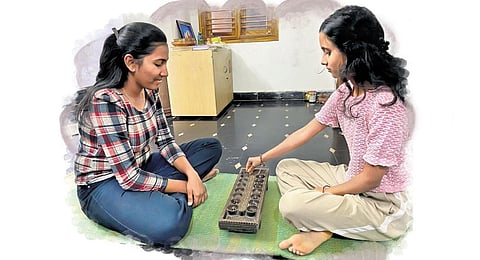

While I was researching options for this article, my husband was joking about how some childhood memories linger forever. He then went on to recite a couplet written by Kabir Das that he had learned in school. It was almost as if he had just studied it for a test yesterday.
Kabir Das was a 15th-century Indian mystic poet and saint whose verses continue to resonate across religious and cultural boundaries. Born in or around 1398 in Varanasi, Kabir was one of the most influential figures of the Bhakti movement.
It was his birthday in June, which was reason enough to do some digging. With my passion for traditional games, I started researching Kabir Das’s associations with games and play. There is no historical record or mention of Kabir Das engaging in games or recreational play as we think of it today. His life was centered around spiritual inquiry, poetic expression, and challenging the religious orthodoxy of his time, even when he was a child.
What I did find interesting was that Kabir Das used the metaphor of life as a game in several of his dohas, or rhyming couplets in two lines. Here are a couple of few that reflect this theme
Khel khel mein kheliye, khel khel mein hoy
Khel khel mein mil gaya, sahaj sahaj hi soy
Translation:
Play the game playfully, let it remain a game.
In this playful spirit, one finds the divine easily and naturally.
Meaning:
Kabir encourages a joyful, light-hearted approach to life and spirituality. The divine is found not through struggle, but through simplicity and surrender.
Jeevan khel kahe Kabir, yeh khel anokha
Jo khel so jaaniye, jo jaane so roya
Translation:
Kabir says life is a game, a unique one indeed.
The one who plays it understands, and the one who understands often weeps.
Meaning:
True engagement with life reveals its spiritual depth. Realization brings both joy and sorrow — the sorrow of illusion and the joy of awakening.
The interesting thing about research is that sometimes you find a little string, then you pull on it, and you never know where it leads. The more I read, the more I was fascinated. It was interesting to discover how many writers used such metaphors.
The metaphor of play is a very helpful concept to understand the world and the relations between humans and the world. It has been explored across philosophy, psychology, art, and cultural theory.
At its core, using ‘play’ metaphorically allows us to understand complex human experiences.
Play thus functions as a metaphor, not just as a child’s pastime, but as a lens through which we understand life, work, and relationships. This metaphor is used widely by many writers that the words denoting play have become part of our everyday language.
They’re playing both sides - has become a metaphor for behind-the-scenes tactics that shape outcomes.
Let’s play with this idea - means an exploration that leads to insight. But it is not just Kabir Das. The song The Winner Takes It All from ABBA has the lyrics:
The Gods may throw a
Their minds as cold as ice…
It simply cannot be ignored. Games and play are everywhere, closely interwoven with our language, our poetry, our music… and our life itself.